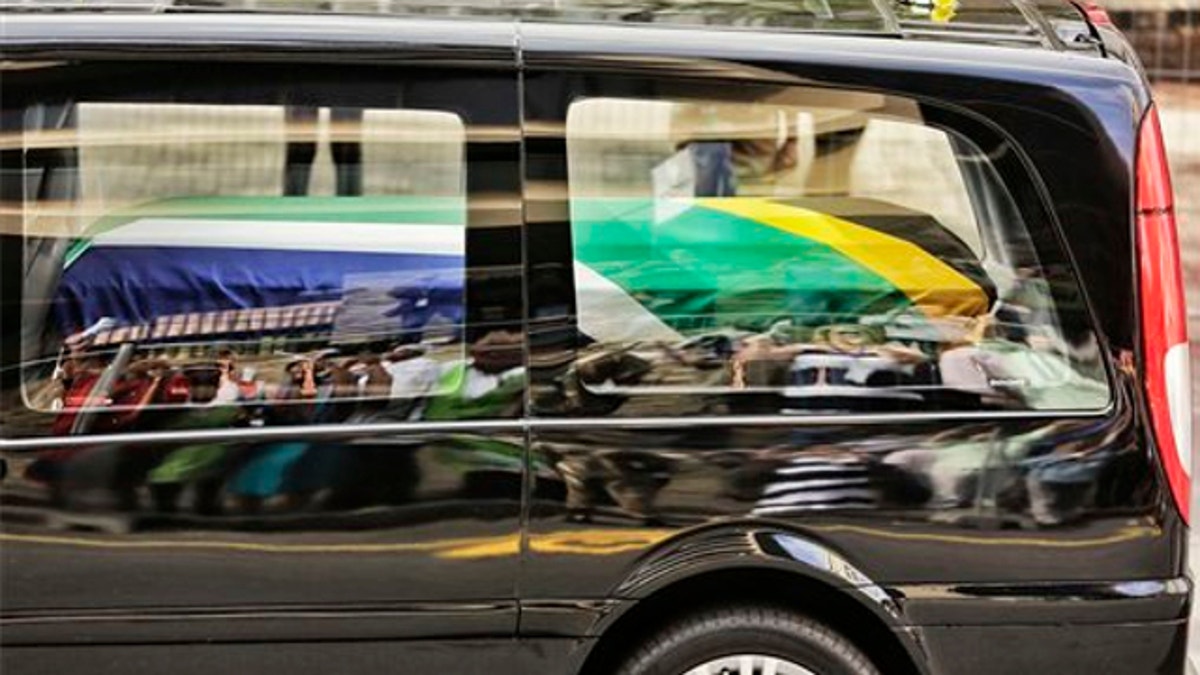
Dec. 11, 2013: People are reflected in the car carrying former South African president Nelson Mandela as it makes its way through the streets of Pretoria, South Africa. (AP)
PRETORIA, South Africa – World leaders bowed and prayed Wednesday before the casket containing the body of Nelson Mandela, taking a final look at the anti-apartheid icon in the amphitheater where he was sworn in 19 years earlier as South Africa's first black president, as crowds lined up to get their views.
Some made the sign of the cross, others simply spent a few moments gazing at Mandela's face through a glass plane atop the coffin at the Union Buildings in South Africa's capital, Pretoria. Leaders like Zimbabwe President Robert Mugabe, South African President Jacob Zuma and others passed by the casket in two lines. Four junior naval officers in white uniforms kept watch. Celebrities like singer Bono of the band U2 also paid their respects. So did F.W. de Klerk, the last president of white rule who shared a Nobel Peace Prize with Mandela for ending the apartheid era.
Mandela’s widow Graca Machel, his former wife Winnie Madikizela-Mandela and other family members also viewed his body.
Some appeared lost for a moment looking down at Mandela. South Sudan's Salva Kiir Mayardit stood for a moment, transfixed, before removing his trademark black cowboy hat and crossing himself.
Fox News’ Greg Palkot, who viewed the body, said Mandela had a natural, but serene look on his face that shown little signs of the harsh illness that he endured. Lines to view the body were spreading through the streets of Pretoria.
"I just hope I won't cry," said Paul Letageng, 47, an employee there. "It's amazing to think that 19 years ago he was inaugurated there, and now he's lying there. If he was not here we would not have had peace in South Africa."
Mandela emerged from 27 years in prison under the white racist government in 1990, appealed for forgiveness and reconciliation and became president in 1994 after the country's first all-race democratic elections. He gave his inaugural address from the amphitheater, which Zuma named after him by decree.
Mandela said at his inauguration: "Out of the experience of an extraordinary human disaster that lasted too long, must be born a society of which all humanity will be proud."
On Wednesday morning, motorcycle-riding police officers escorted the hearse from a military hospital outside of Pretoria to the Union Buildings. People lined the streets to watch the procession , singing old songs from the struggle against the apartheid regime and calling out their farewells to Mandela, who died Dec. 5 at the age of 95. Police blocked traffic, backing up cars for several miles on a highway leading into Pretoria.
Army helicopters had been circling overhead but then a sudden quiet fell over the amphitheater as the hearse arrived. Eight warrant officers representing the various services and divisions of the South African National Defense Force carried the casket, led by a military chaplain in a purple stole. The officers set down the coffin and removed the flag.
Officials have banned cameras from the viewing area and asked people to turn off their mobile phones.
Mandela's body will lie in state for three days at the Union Buildings, which the South African government describes as a "modern-day acropolis" atop a hill overlooking Pretoria. The architect who designed it envisioned its two wings, made of half a million cubic of stone, representing the Afrikaans and English languages spoken in the country -- but none of the land's native languages.
Even from its inception, the building long has been considered a symbol of governance in the country -- and of apartheid until Mandela took office.
Each day, Mandela's coffin will be driven back to 1 Military Hospital to be held overnight. Authorities have asked the public to line the street as an honor guard for each trip.
Mandela's body will be flown Saturday to Qunu, his home in the Eastern Cape Province. He will be buried Sunday.
On Tuesday, world leaders including President Obama eulogized Mandela. In his speech, Obama called Mandela "the last great liberator of the 20th century."
"We will never see the likes of Nelson Mandela again," Obama said. "But let me say to the young people of Africa, and young people around the world -- you can make his life's work your own."
The Associated Press contributed to this report.
